

"Together as the Dubliners, they are enough to warm the heart of any Irishman and to frighten the British immigration authorities. They are Dublin's darlings; impossible for an audience to resist and impossible to record. We recorded them."
Nathan Joseph — 1964
Formed in 1962 in O'Donoghue's Pub, Dublin, The Dubliners were arguably the most popular Irish Folk Band in the world. The founding members were Ronnie Drew, Barney McKenna, Luke Kelly and Ciarán Bourke, with John Sheahan joining the group in 1964. In 2012, while celebrating the band's 50th anniversary, Barney McKenna, the last surviving founding member, passed away on April 5th, at the age of 72. Towards the end of that year John Sheahan announced his retirement — officially ending the era of The Dubliners.
Much of the information on the band's history through 1986 comes from an interview I conducted with Ronnie Drew at Bewley's in Dublin, Ireland on Thursday, September 11, 1986. This site is dedicated to Ronnie Drew.
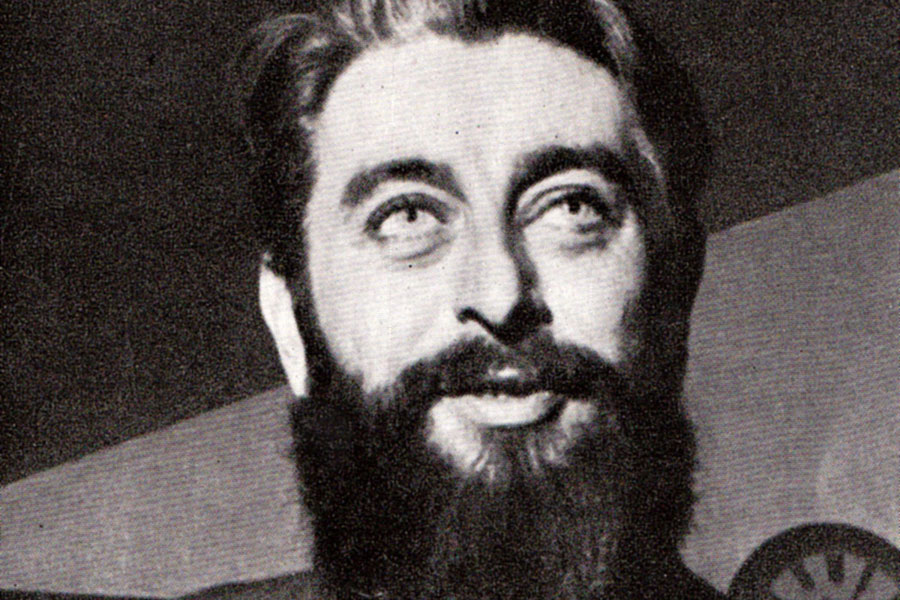
Around 1961, Ronnie Drew returned to Dublin from Spain, where he had learned the guitar, and began to perform informally at parties, singing songs, and telling stories. A relatively well-known comedian by the name of John Molly heard Ronnie at one these parties and invited him join his show at the Gate Theatre. Ronnie was glad to go along as the "curtain warmer", as well as to perform solo spots throughout the show and feed Molloy straight lines. Molloy wanted to add another musician and Ronnie suggested tenor banjo player Barney McKenna.
"… he wanted this musician for the girls — somebody who wasn't in the blue suit. I said, 'What about Barney McKenna?' and I got Barney in and Barney played for them. That started the association with Barney and myself. John Molloy … he live up in a place called Eli Place, which is just around the corner from O'Donoghue's Pub. We used to go over … Barney and myself … to meet John there every Friday to get paid." — RD
In 1962, Ronnie, Barney, Luke Kelly & Ciarán Bourke, begin playing together at informal sessions in O'Donoghue's.
"At the time, Donoghue's Pub was a very, very quiet pub … civil servants used to be sneaking in from their offices to have small whiskeys and things. Luke Kelly had come home from England and he came into Donoghue's. Ciaron Bourke was studying in the University … he used to play the tin whistle and play the guitar and one night we asked Paddy Donoghue, round about Christmastime, could we play a few tunes. So we played a few tunes. That was it. The music has never stopped in Donoghue's since that day. That was more or less how the whole thing got going—or how the whole thing began." — RD
The band, initially known as "The Ronnie Drew Group", are asked to play in other pubs around Dublin.
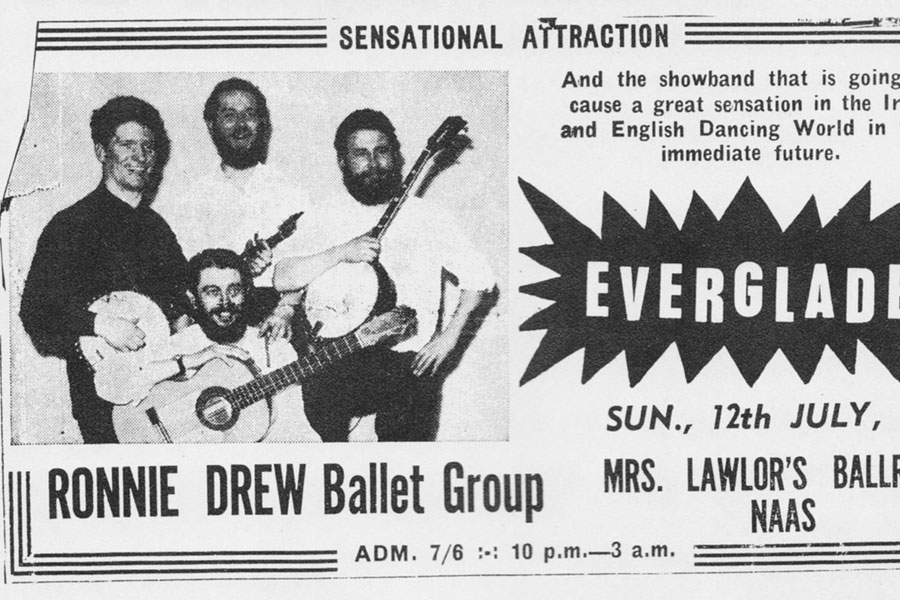
"People used to ask us to sing in places and we got a few pounds for playing. All these pubs which they used to euphemistically call cabarets — they're just pubs — a room where you can sing. So we got a few of these.I had — which isn't hard to do — attained a little fame in Dublin, because Dublin's very small and you know all the reporters. One day … we said we'd change the name to something else, because I didn't like the responsibility of being called 'The Ronnie Drew Group' from the start. Luke happened to be reading James Joyce's 'Dubliners'. So why not be call it The Dubliners?" — RD
Mary Jordan, introduced them to the Abbey Tavern in Howth, where they would play every Saturday night — eventually moving their gig across the road to the Royal Hotel.
"After a few weeks, I began to realize there was an awful lot more money coming in the door than what we were getting, because she was getting the price of all the drinks she sold. So I went to the hotel across the road — The Royal Hotel — and I said to your man, 'How about us playing here on Saturday night?' They said, 'Sure.' My wife went out and took the money at the door and we shared out what we had taken in. It became a kind of craze then, you see and a sort of a club, a lot of people used to come out to it. They'd come out every Saturday night — not necessarily to hear the music — but they made friends — a nice meeting place and the whole thing sort of bloomed then."
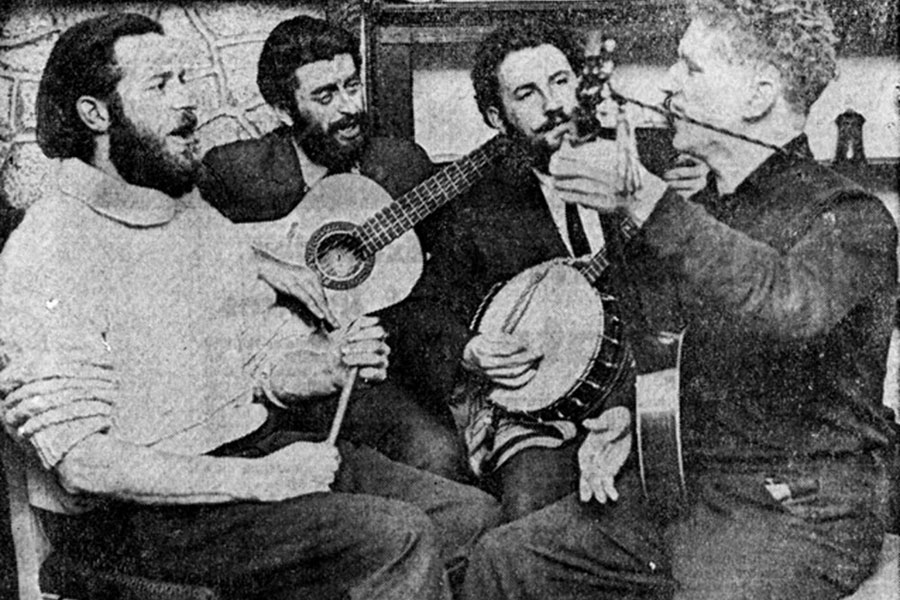 "There were groups everywhere. They were coming out of the taps when you turned them on. Everybody was imitating everybody else — the same formats. We were kind of lucky in one way in that — the only the thing that I sorry for is that we didn't record enough material early. We had all this material, which has subsequently been recorded, but we never used it." — RD
"There were groups everywhere. They were coming out of the taps when you turned them on. Everybody was imitating everybody else — the same formats. We were kind of lucky in one way in that — the only the thing that I sorry for is that we didn't record enough material early. We had all this material, which has subsequently been recorded, but we never used it." — RD
As their reputation in and around Dublin began to grow they acquired their first real manager, John Sheridan. They played every Monday night at Mick McCarthy's famous Embankment Club in Tallaght in the Dublin Mountains. The folk revival was gaining momentum in Britain, and with help from Luke's contacts in England and Scotland and great encouragement from Domnic Behan, the Dubliners were invited to play the Edinburgh Festival in 1963. This performance not only led to a meeting with Nathan Joseph, the head of Transatlantic Records, but appearances on a series of programs recorded at the Howff in Edinburgh and broadcasts on the BBC.
In 1964, the group released their first album, The Dubliners with Luke Kelly on the Transatlantic label. During this period Luke became restless and decided to leave the group and go back to England.
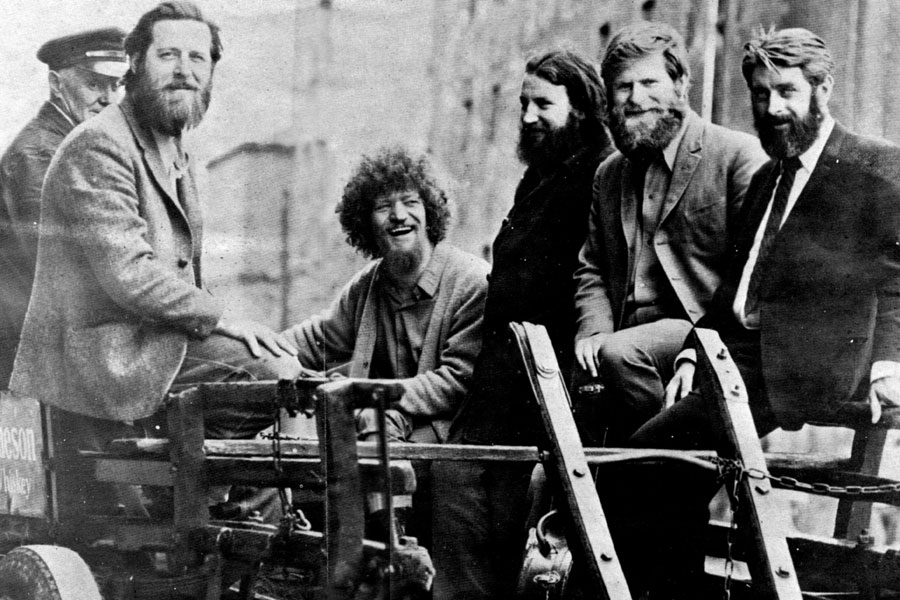 "Then after a year — about 1963 or 64, Luke announced he was going back to England and sing in these folk clubs. I had heard John Sheahan and a friend of his — a fella called Bobby Lynch. They were kind of hanging around, doing spots here and there. So I asked them if they'd like to join the Dubliners, so they did." — RD
"Then after a year — about 1963 or 64, Luke announced he was going back to England and sing in these folk clubs. I had heard John Sheahan and a friend of his — a fella called Bobby Lynch. They were kind of hanging around, doing spots here and there. So I asked them if they'd like to join the Dubliners, so they did." — RD
This grouping produced a live album, The Dubliners in Concert and O'Donoghue's Opera on RTE; the latter was recently restored and played at the Dublin Film Festival. After a year in England, Luke decided to return, and Bobby Lynch, who was more content being a part-time musician, left the band.
"About a year later, Luke came back. And Bobby Lynch just left because he had a job in the daytime. He worked in the Department of Agriculture or some thing. So Luke stayed with us then. For a good period then there were five of us. We did a show in 1966 at the Gate Theatre in which we had Joe Heaney. He was a great traditional sing for Carne in the west of Ireland. He was a native Irish speaker. He sang an awful lot of songs in Gaelic. During that show, we introduced Joe to the public in Dublin who really had never listened to this kind of singing. It was totally unaccompanied and very stylized. On several shows we at the Gate we had Paddy Maloney of the Chieftains. Another day we had Martin Fay of the Chieftains. Another time we had Tommy Reck — several people joining in. We were sort of working our way here." — RD
This line-up of Ronnie Drew, Luke Kelly, Barney McKenna, Ciarán Bourke and John Sheahan is considered the essential Dubliners and remained intact until 1974. In 1966, the Dubliners released their 3rd and last album on the Transatlantic label, Finnegan's Wakes, recorded at the Gate Theatre during their run of the same titled shows.
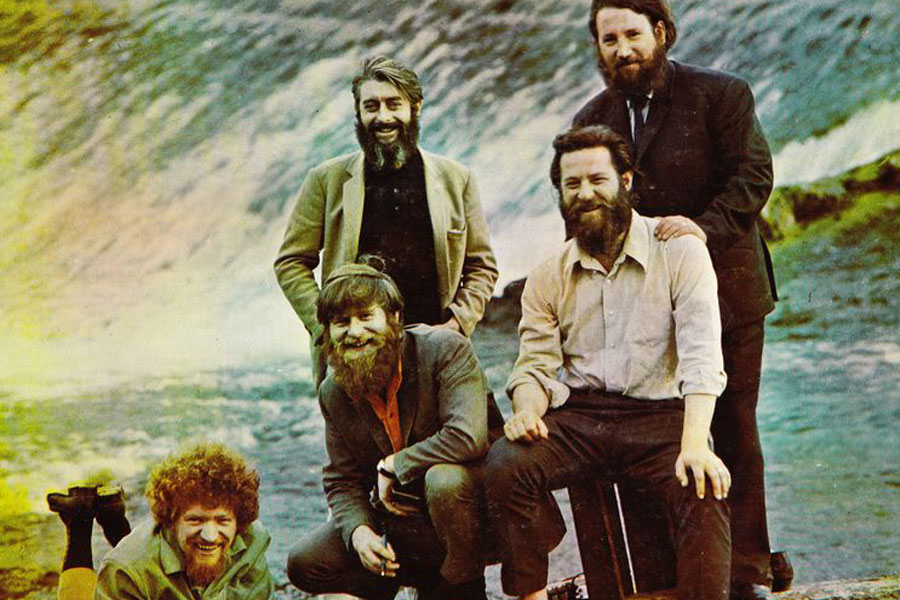 The Dubliners signed with the Major Minor label in 1967 and this proved to be the turning point
in the career of the Dubliners. On St. Patrick's Day of that year they released the single,
"Seven Drunken Nights". Radio Telefis Eireann refused to play the song, due to its
"questionable" content, and instigated an unofficial ban on the Dubliners that lasted
for years. Fortunately, Radio Carloine had no such misgivings about the song and played it often;
the single sold 40,000 copies within two days and went on to sell in excess of 250,000. The song
was subsequently picked up by the BBC and went to number 5 on the British charts.
The Dubliners signed with the Major Minor label in 1967 and this proved to be the turning point
in the career of the Dubliners. On St. Patrick's Day of that year they released the single,
"Seven Drunken Nights". Radio Telefis Eireann refused to play the song, due to its
"questionable" content, and instigated an unofficial ban on the Dubliners that lasted
for years. Fortunately, Radio Carloine had no such misgivings about the song and played it often;
the single sold 40,000 copies within two days and went on to sell in excess of 250,000. The song
was subsequently picked up by the BBC and went to number 5 on the British charts.
"Then Dominic Behan got us in touch with a fella called Philip Solomon in London. And Philip Solomon wanted to take us on and be our manager. None of us had any business acumen or that about the thing. The money handling was purely to have money — not to hoard money — but just to have some money for a change. We made a record of that song 'Seven Drunken Night' which strangely enough was given to me by Joe Heaney, this Gaelic singer. It went to number five in the British Top 20 charts and we had to appear on 'Top Of The Pops' — most unlikely crew. And at this stage we were playing all over England. If nothing else, it opened us up to a very wide audience."
"The BBC were very annoyed at me because I did an interview for the BBC. And they tended to treat us as fellas who could play and sing, but not a lot upstairs — not too much. Not that it bothered them, being the BBC. I resented this attitude. The said, 'How does it feel to be in the top 20?' I said, 'It's great. We got more gigs and more money.' What he wanted me to say was, 'Fantastic — we've reached the top.' 'Oh,' I said, 'it's no reflection of our talent if that's what you mean. It's not a great song. It's a nice little song. A business machine went into operations and the public were told to buy it and they bought it.' There'd be none of these things unless business machines went into operation. It was played ad nauseam on the radio, except of Radio Eireann, our own radio stations. It was banned here because they felt the content was irreverent and a bit lewd. Stupid! But the strange thing was that Joe Heanney had sung for years in Gaelic on the same stations and nobody ever banned it. So we made great capitol out of that. That opened us up to a far wider audience." — RD
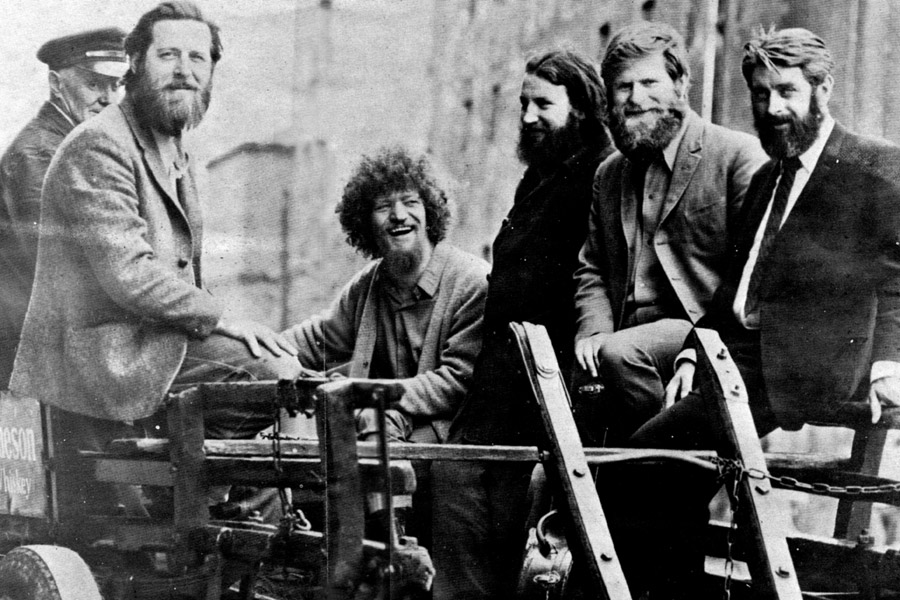 Between 1967 and 1969, the Dubliners followed with 5 more albums on Major Minor and a number of
singles, including "The Black Velvet Band", which also charted in Britain. As their reputation
grew they began to tour outside of Ireland and Britain to tremendous success, particularly in Germany
and Scandinavia where they remained very popular.
Between 1967 and 1969, the Dubliners followed with 5 more albums on Major Minor and a number of
singles, including "The Black Velvet Band", which also charted in Britain. As their reputation
grew they began to tour outside of Ireland and Britain to tremendous success, particularly in Germany
and Scandinavia where they remained very popular.
On May 1, 1969, The Dubliners gave six-month's notice to their current management (Scott Solomon Management and The Dorothy Solomon Agency) and Major Minor that they wished to terminate their agreements with them. Considering their popularity at the time, Major Minor and the respective Solomons were none too pleased by the boys' decision.
These breaks caused widespread speculation that the band was splitting up. However, the Dubliners were far, far from finished. The band embarked on tours of Canada, the US and Britain. In December 1969, they released the album At Home With The Dubliners.
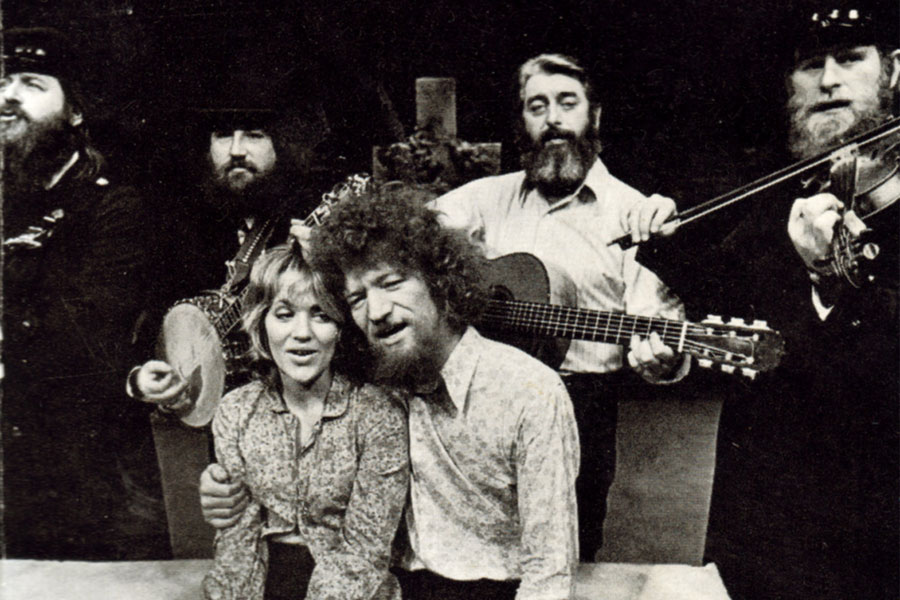 Several more albums followed, including Revolution,
Hometown and Double Dubliners,
all on the EMI label, with whom they'd signed after their split with Major Minor. In 1972, The Dubliners embarked
on a series of very successful tours in Belgium, Scandinavia and Germany.
Several more albums followed, including Revolution,
Hometown and Double Dubliners,
all on the EMI label, with whom they'd signed after their split with Major Minor. In 1972, The Dubliners embarked
on a series of very successful tours in Belgium, Scandinavia and Germany.
That same year Luke Kelly played the part of King Herod in Jesus Christ Superstar. There he met Jim McCann for the first time who played the part of Peter. Later that year, the Dubliners appeared in Brendan Behan's play, Richard's Cork Leg, at the Abbey Theatre, Dublin and at the Royal Court Theatre, London.
"A fellow called Alan Simpson — he's dead since you know — Allan had done Brendan Behan's first play but this play Brendan never finished. We were all there. Luke played 'Cronin' and I played 'the Hero'. Several actresses from the Abbey and some actors played in it too. Luke and I had a certain amount of experience of the stage. I had been in several plays when I was working with John Molloy. While I wouldn't regard myself as a Laurence Olivier, I at least had some experience. Barney didn't have any experience as an actor. He really wasn't able to deliver the lines, so Noel Pearson — he was our manager at the time and he was putting on the play — he hired this guy from Nigeria — a big very imposing guy and he played the part Barney was playing. To keep Barney in the play, Barney used follow him around saying, 'Yes boss.' 'That's right, boss.' It wasn't a great play but it was good fun. I really enjoyed it." — RD
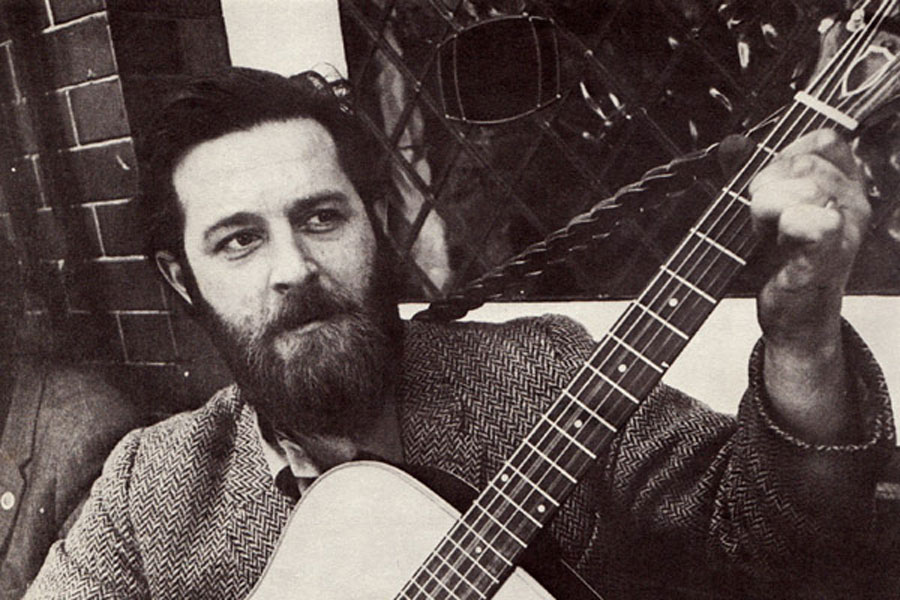 The Dubliners were touring England during 1974, and on April 5, while they were appearing in Eastbourne,
tragedy struck. Ciarán Bourke was having severe headaches and had to leave the stage. He was
taken to the hospital where he was diagnosed with a brain hemorrhage. He was then rushed to the
Neurological Department of St. George's Hospital in London. Ciarán was determined to return to
the group and rejoined them later in the year on the German tour. He should never have returned so quickly
for during the tour he collapsed and had to be flown back to Dublin. This time he was left partially paralyzed
and could no longer perform with the group. Later that same year, Ronnie chose to leave the group.
The Dubliners were touring England during 1974, and on April 5, while they were appearing in Eastbourne,
tragedy struck. Ciarán Bourke was having severe headaches and had to leave the stage. He was
taken to the hospital where he was diagnosed with a brain hemorrhage. He was then rushed to the
Neurological Department of St. George's Hospital in London. Ciarán was determined to return to
the group and rejoined them later in the year on the German tour. He should never have returned so quickly
for during the tour he collapsed and had to be flown back to Dublin. This time he was left partially paralyzed
and could no longer perform with the group. Later that same year, Ronnie chose to leave the group.
"That year my children were growing up and I felt I was being away from home too long. We'd be away for a period of six weeks, then we'd be home for two and away for another six weeks. I didn't want my family to be suffering for lack of contact. My children were growing up and I wanted to be there. So I decided to I'd pack it up and do something on my own. So I packed up in June or July of 1974." — RD
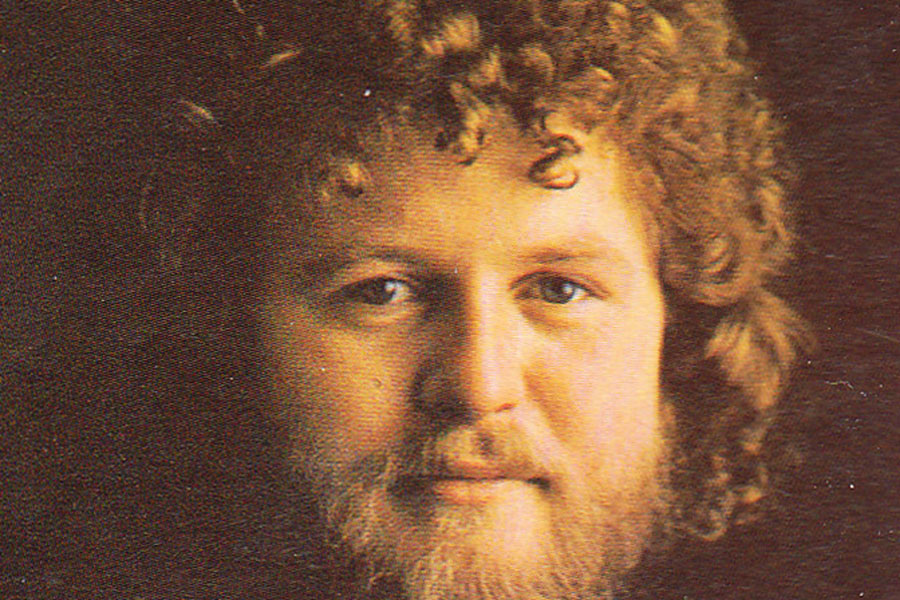 Jim McCann was asked to join and in 1975 the group released Dubliners Now, followed by
Parcel of Rogues in 1976, and 15 Years On
and Live In Montreux in 1977,
15 YearsOn being a compilation album with tracks from the Ronnie and Ciarán
years, as well several new Jim McCann cuts. In 1978 Jim McCann decided return to his solo career.
Jim McCann was asked to join and in 1975 the group released Dubliners Now, followed by
Parcel of Rogues in 1976, and 15 Years On
and Live In Montreux in 1977,
15 YearsOn being a compilation album with tracks from the Ronnie and Ciarán
years, as well several new Jim McCann cuts. In 1978 Jim McCann decided return to his solo career.
"I was in bad car accident in November 1978. I broke my hip and I was in the hospital. Jim McCann decided to leave the group. So John Sheahan asked me to come back to the group. I said, 'I might as well.' I've had a rest now and I'd had 4-4 ½ years at home and things were okay. So I joined the group again. I did the first gig in England on crutches." — RD
In 1979, The Dubliners, Ronnie, Luke, Barney & John, released Together Again, a very good and more somber album featuring Ronnie and Luke singing Pete St. John, Ewan MacColl, Eric Bogle and Ian Campbell songs.
On June 30, 1980, at a concert in Cork, Luke Kelly collapsed on stage.
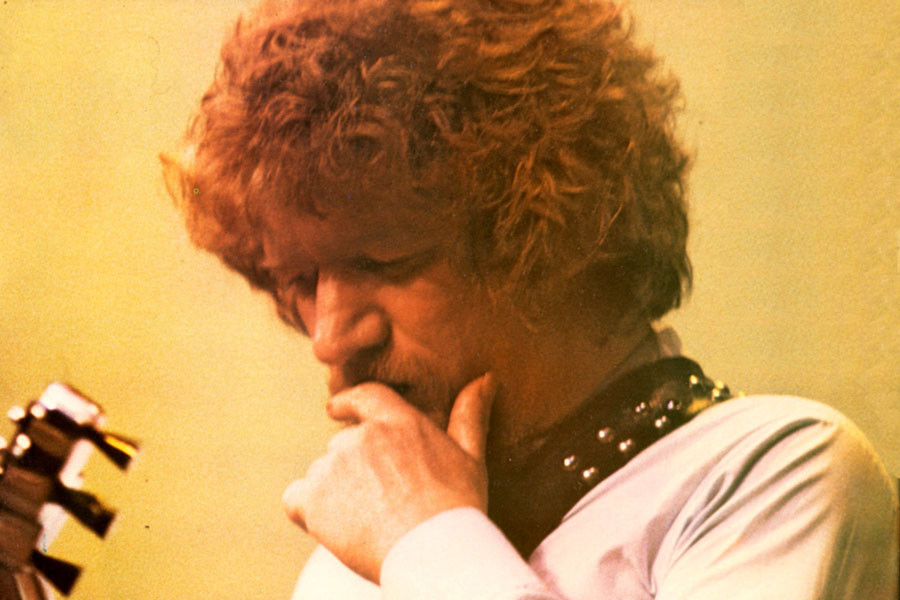 "When I left the group in 1974, he was okay. Then when I went back to the group, about a year or two after I
returned to the group, which was 1979, Luke used to drink a fair bit. He was forgetting words on stage.
We all thought he was drinking too much. But it was happening when he wasn't drunk that he
would forget. I said a lot of times he wasn't drinking that much that he couldn't remember.
But it turned out anyway that he had a brain tumor. One night we were in Cork". "We were
on the stage of the Opera House in Cork. Luke had started singing a song. I noticed his hand shaking,
but I didn't mind that because it sometimes happens from too much adrenaline. It's
happened to me a couple of times. I was watching and in case he got it too bad, I was ready to take
over the song so the people wouldn't know. The next thing he started slurring his words. The
next thing he just collapsed and was rushed to straight into the hospital and they did an operation on
his head that night." — RD
"When I left the group in 1974, he was okay. Then when I went back to the group, about a year or two after I
returned to the group, which was 1979, Luke used to drink a fair bit. He was forgetting words on stage.
We all thought he was drinking too much. But it was happening when he wasn't drunk that he
would forget. I said a lot of times he wasn't drinking that much that he couldn't remember.
But it turned out anyway that he had a brain tumor. One night we were in Cork". "We were
on the stage of the Opera House in Cork. Luke had started singing a song. I noticed his hand shaking,
but I didn't mind that because it sometimes happens from too much adrenaline. It's
happened to me a couple of times. I was watching and in case he got it too bad, I was ready to take
over the song so the people wouldn't know. The next thing he started slurring his words. The
next thing he just collapsed and was rushed to straight into the hospital and they did an operation on
his head that night." — RD
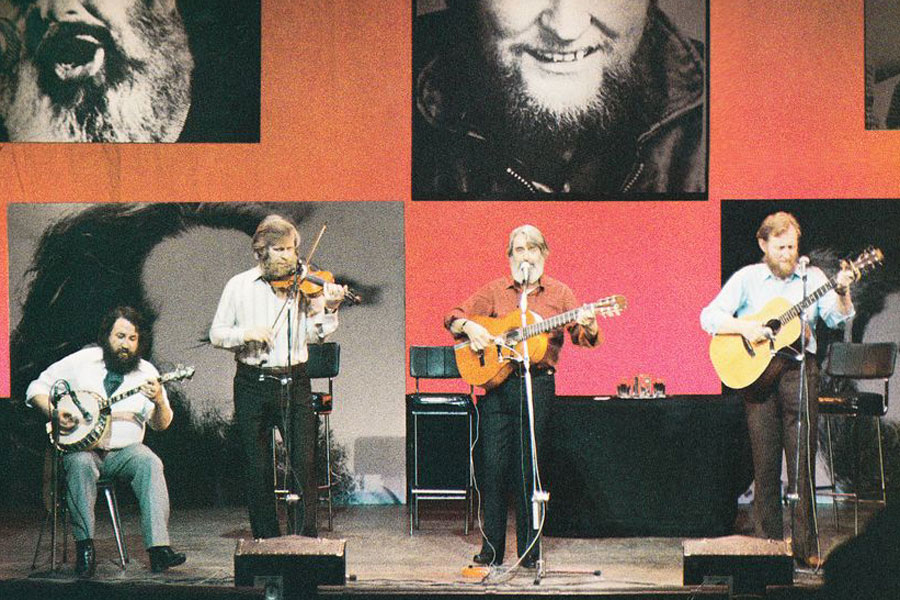
Luke recovered and returned to the group on a part-time basis. In the meantime, Seán Cannon was asked to fill in for Luke.
The group had begun recording Prodigal Sons with Luke, but when the album was released it didn't contain any of his songs. His versions of "A Song For Ireland" and "Raglan Road" from those sessions were subsequently released on Luke's Legacy after his death. In October 1982, Bob Lynch committed suicide in Dublin, continuing the Dubliners' string of tragedies.
1983 saw the releases Prodigal Sons and 21 Years On, the latter being a live album recorded at the Dublin Concert Hall. In the autumn of that year the group embarked on tour with Luke Kelly. A concert at the Carré in Amsterdam was recorded and later released as an album, Live in Carré. This was Luke Kelly's last recording. The Dubliners continued on to Germany, where Luke again collapsed.
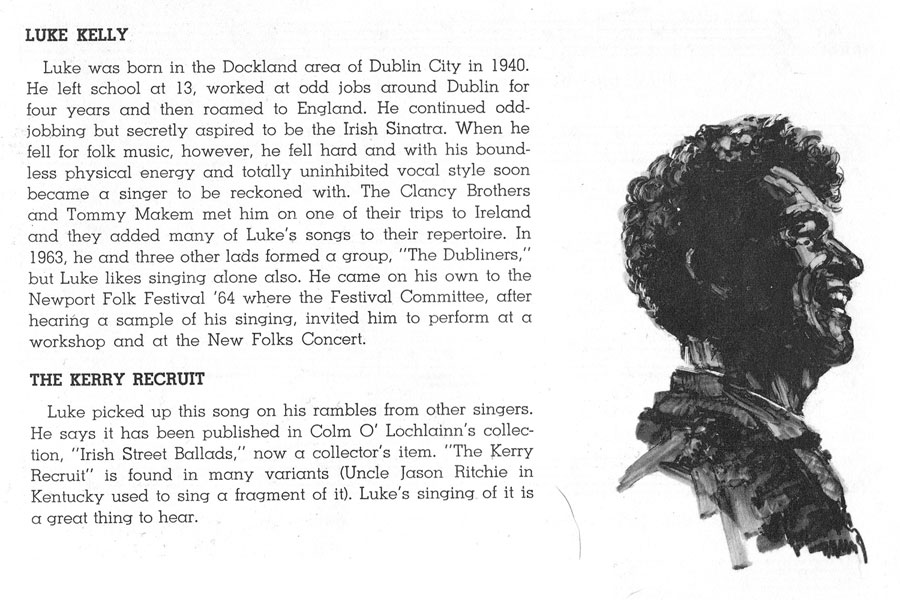
"I can't remember the name of the town we were in but he had to be taken off. It was somewhere near Heidelberg. He was taken to Heidelberg to one of the clinics. A couple of days after we had a day off and we were traveling to Stuttgart. I didn't like going on the bus, so I said, 'I'll get a train to Heidelberg and then a train on to Stuttgart.' It was a day off and I wanted to make use of the day off as well. The lads tend to get up late in the day and I tend to get up early. So I got up early and I got a train to Heidelberg by ten o'clock in the morning. I didn't know what hospital he was in, but I just went into a hospital and inquired and it turned out he was in it. There were a lot of clinics in Heidelberg. I went in and sat down for over two hours. It was a great chat—talked away. A couple of weeks later, he was gone home from Heidelberg with all his medical data to Dublin."
"He was out of hospital and had another operation on his head and I went to see him when I came home from Germany, which was about December. Shortly after that he went home for Christmas. Then at the end of January we got word that he was in hospital and very bad. I went into the hospital about nine o'clock and I stayed all night and he died that night".
"He had a huge funeral in Dublin—television and radio and all the papers. In fact, there were so many there they had to get police on motorbikes. Here in Ireland when you die you go to the church—the Catholic Church. His church—I mean his family's church—Luke didn't go to mass—Catholicism dies very hard in Ireland. So he was brought over to the church. But they had to go right through the city at half-past five. There were a good six guys on the motorbikes—policemen—driving the whole way in front to get through the traffic. Luke would have had a laugh because Luke used to have run-ins with the police. They were all there—politicians from both sides of the divide. It was a terrible loss." — RD
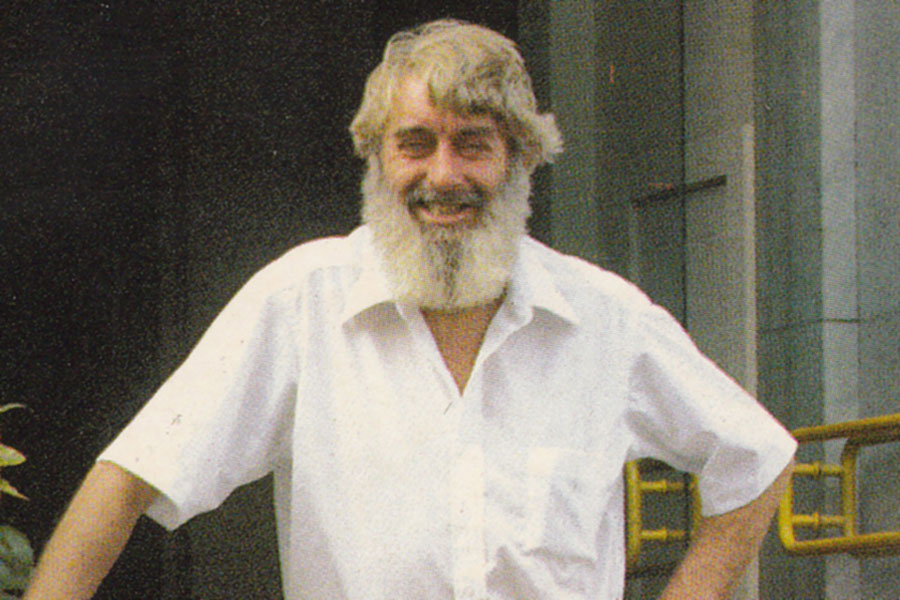 Between 1984 and 1987, the Dubliners continued to tour; in Germany, Scandinavia and Australia their
popularity hadn't diminished, but in Ireland they played less. During this period Ronnie was looking
to the future with and without the Dubliners.
Between 1984 and 1987, the Dubliners continued to tour; in Germany, Scandinavia and Australia their
popularity hadn't diminished, but in Ireland they played less. During this period Ronnie was looking
to the future with and without the Dubliners.
"I've been branching out and doing a lot of stuff on my own because when you're playing with the Dubliners all the time it's like being one show for 25 years. I've been doing quite a few things on my own recently. I think you need to get out because you get a bit stale in the group. Next year the Dubliners will be 25 years together. I think it's time we're going to make an album—a double album next year. We're only going to do three or four old numbers and twenty-four new ones as well and Jim McCann will be on it and there's a group in England called the Pogues—they say they've been influenced by us, and they're going to get to do one song with us. I'll probably have Stockon's Wing as well doing another number that we did in Australia — 'Now I'm Easy.'" — RD
The album to which Ronnie was referring was Celebration, and with it an appearance on the Late, Late Show, the Dubliners made a most spectacular comeback (although, in fact, they'd never really been away). The Late, Late Show tribute included appearances by Jim McCann, Christy Moore, U2, The Pogues, Stockton's Wing, Charles Haugey and a moving recitation by Ciarán Bourke. Their collaboration with The Pogues of "The Irish Rover" blew off the roof and the Dubliners, once again, experienced popularity on par with their heyday in the sixties. Countless television appearances and sold-out concerts followed.
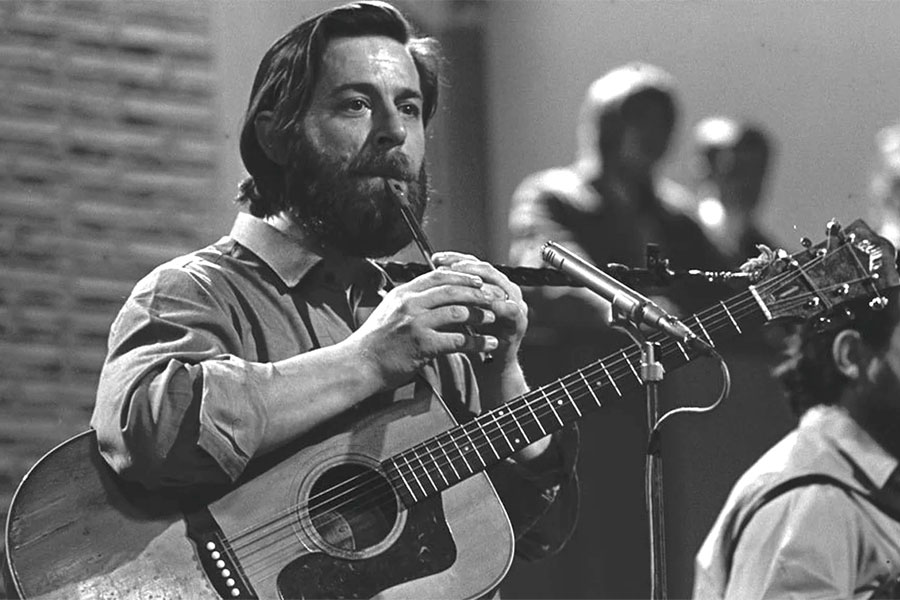
In 1988, the group contribute several tracks on the Official Dublin Millennium Album. Ronnie also took a verse (from the same album) on Band Of Dubs' version of "Molly Malone", with the rest of the group also playing on the song.
That same year, The Dubliners suffered yet another tragedy. While on tour in England, the group received word that Ciarán had been rushed to the hospital and was in very serious condition. The group flew back to Dublin and within hours of their arrival at the hospital Ciarán Bourke passed away. While Ciarán had been unable to perform for over ten years, The Dubliners continued to pay him (a fact never made public until after his death) and did not take on a full-time 5th member during his lifetime.
After Ciarán's death, Eamonn Campbell was asked to officially join the group. Later in 1988, this line-up of Ronnie, Barney, John, Seán and Eamonn released The Dubliners' Dublin.
In 1992 The Dubliners celebrate their 30th Anniversary, with the release of 30 Years A Greying. Much like Celebration, 30 Years A Greying included several guest appearances, this time from, Billy Connolly, Hot House Flowers, Rory Gallagher and The Pogues.
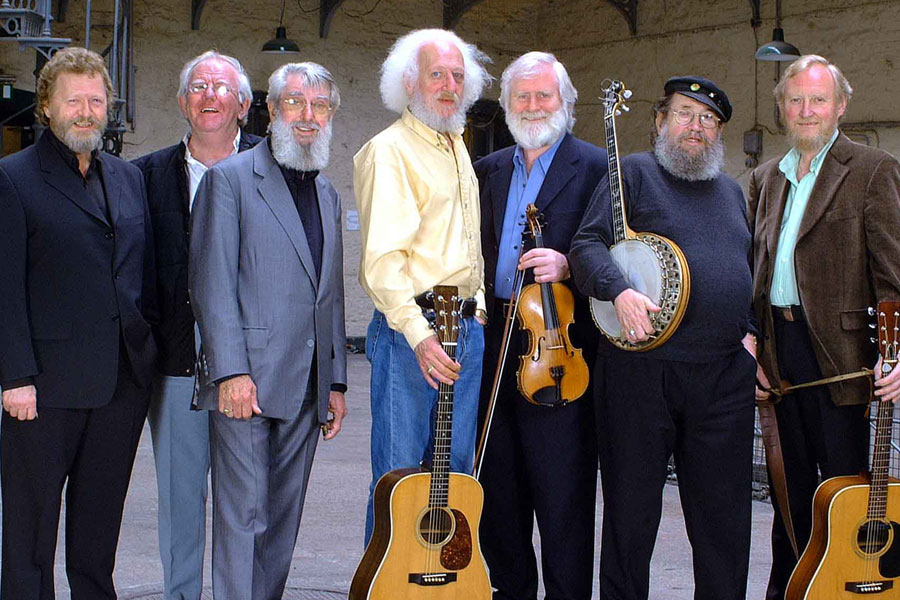
Ronnie Drew once again leaves group, in 1992, and goes solo, with Paddy Reilly taking his spot. The Dubliners (w/Paddy Reilly) release two albums, Further Along in 1996 and Alive, Alive O in 1997.
2002 marks he band 40th anniversary and the release of 2 CDs and 1 DVD — featuring all of the surviving Dubliners (past and present). Unfortunately, during the subsequent tour, Jim McCann was diagnosed with throat cancer. Jim embarked on a very aggressive battle, but the treatment damaged his voice and effectively ended his singing career.
In the fall of 2005 Paddy Reilly leaves The Dubliners and is replaced by Patsy Watchorn. The Dubliners release Live At Vicar Street, in 2005, on CD and DVD.
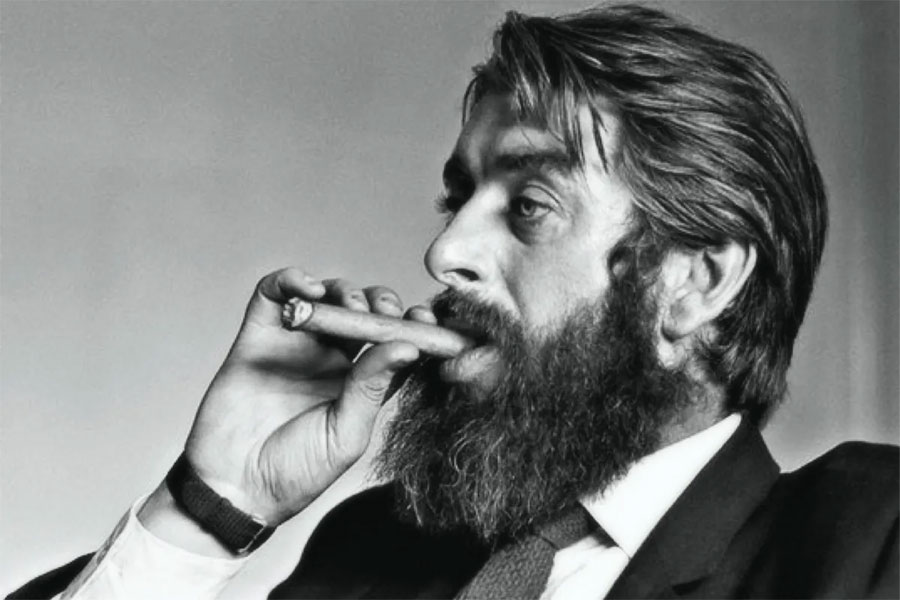
On Saturday, August 16, 2008, Ronnie Drew passes away at the age of 73, after a year long battle with cancer. President (of Ireland) Mary McAleese led tributes: "It is with great sadness that I have learned of the death of the great Irish singer Ronnie Drew … he was a champion of traditional Irish music and with The Dubliners re-energised and refreshened Ireland's unique musical heritage".
In 2009, The Dubliners last album, A Time To Remember, is released.The Dubliners celebrate their 50th Anniversary as band in 2012, with tour dates scheduled throughout the year. Sadly, on April 5th, Barney McKenna, the last surviving founding member, passed away at the age of at the of 72. Gerry O'Connor was recruited to fill in for Barney on most of the remaining performances.
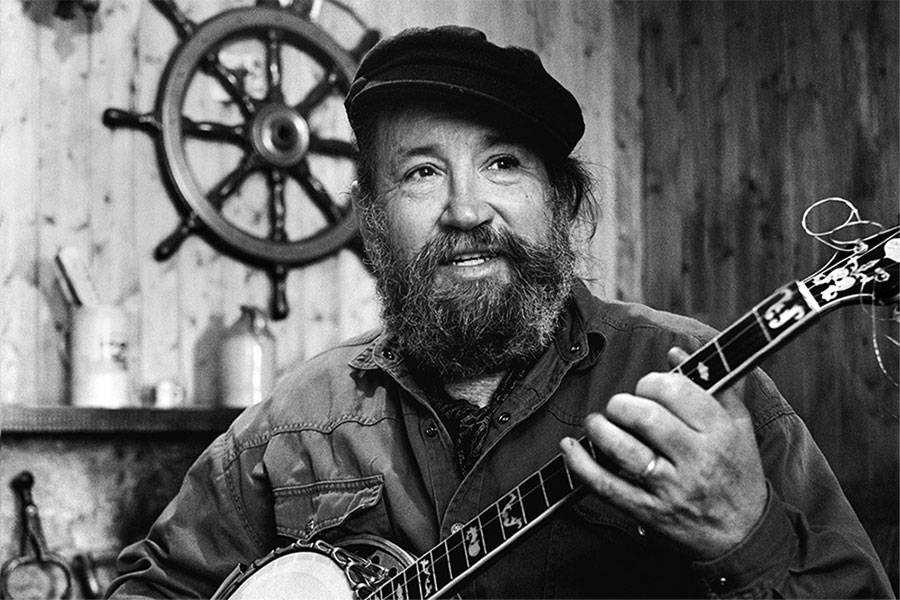
50 Years - Celebration Concert in Dublin, a DVD recorded prior to Barney's death, is released. Towards the end of the year, John Sheahan announced his retirement, officially ending the era of the Dubliners.
Jim McCann passes away, on March 5, 2015, at the age of 70, after a lengthy illness.
Eamonn Campbell passes away, on October 18, 2017 at the age of 70, after a short illness.